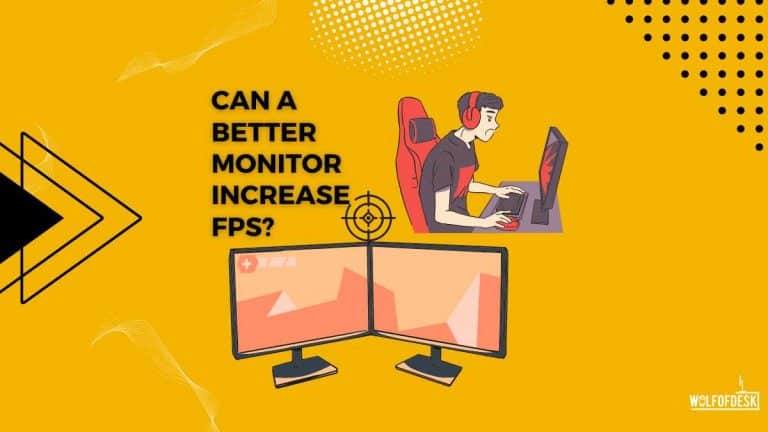Monitors have long been the draw for gamers. From refresh rates to FPS, these terms can feel eerily confusing, especially for newcomers to the scene. With that said, many have wondered, do monitors affect FPS? Or is it the main culprit behind low FPS in the first place?
No, a better monitor does not increase your FPS. That metric is solely dictated by your internal system specifications. However, a better monitor can help display more frames on your computer, depending on its refresh rate.
In this article, we’re going to explore all the different ways a monitor can affect your FPS alongside addressing some common misconceptions that can lead to you making some shoddy purchase decisions!
Can A Monitor Cause Low FPS?
No, a monitor does not control your FPS. However, a worse monitor will have a lower refresh rate which will therefore cause you to see less FPS. So, in essence, a monitor has no control over your frame rate and can only display a certain amount of frames.
To better understand this, let’s presume you have an extremely high-end CPU and GPU which is able to produce frame rates of over 144 in a certain game. Now, if you have a poor monitor that has a maximum refresh rate of 60 – no matter how powerful the rest of your system, you will only see 60 FPS.
On the other hand, if you have a weak CPU and GPU that is able to produce a measly 60 FPS but have a high-end monitor with a refresh rate of 144, no matter what you do, your monitor will be stuck at displaying 60 FPS because that’s all that your system can muster.
Therefore, FPS is directly linked to your system’s internal specification and not to your monitor. When building a computer, it is recommended to both take your refresh rate, and your CPU / GPU combination alongside the games you play into consideration.
For instance, if you play a high-end game, you’d need a good CPU and GPU to be able to produce high enough FPS so that your high refresh monitor can display it. In essence, it’s a delicate mix that you can finesse by taking a look at benchmarks online amongst other metrics.
Does A Dual Monitor Setup Affect FPS?
Yes, a dual monitor or having multiple monitors will affect your FPS. This is because your GPU will have to spend some resources trying to render multiple displays. So, your overall FPS in a game will suffer.
While this may not lead to a huge difference in FPS for newer rigs, you will ultimately face a decline in FPS if you have an older laptop or system. Therefore, it is recommended that you turn all your monitors off before you hop into a game for maximum FPS.
Does A Monitor’s Size Affect FPS?
No, a monitor’s size does not affect FPS. The only metric that affects FPS is the resolution of said monitor. In essence, a 1920×1080 monitor that is 27 inches as compared to one that is 23 inches will produce the same FPS.
This might be the only time where size actually does not matter. However, do note that you might go through a conundrum of purchasing a monitor that is larger in size for it to have such a low resolution in comparison that your image quality suffers.
While yes, your FPS will remain the same in this case, if you opt for a monitor that has a higher resolution, there will be a direct negative impact on your FPS. So, once again, maintaining that delicate mix of your own system resources is extremely pivotal.
Does A Monitor’s Resolution Affect FPS?
Yes, a monitor’s resolution directly affects your FPS. This is because the higher the pixel count of your display, the more individual pixels your system has to render. So, when playing at a higher resolution, your overall FPS will decrease.
As mentioned earlier, picking up the right monitor with an adequate CPU and GPU is a delicate mix. And, in most cases, resolution plays a vital role. Generally, we’re great fans of gaming at 1440p 144 Hz. However, that too is dependent on what types of games you play.
For instance, story-based games can run well on a lower frame rate and will appear much crisper on higher resolution. On the other hand, you probably don’t want to play Valorant on 60 FPS and would instead succumb to some of that crispiness for smoother refresh rates.
Does Using An External Monitor On Laptop Increase FPS?
Yes, using an external monitor on a laptop does increase FPS. This is because your laptop’s own monitor is connected through your integrated GPU to your dedicated one. On the other hand, an external monitor bypasses that bottleneck entirely.
While the difference in FPS isn’t all that drastic, it does make a real-life difference. In essence, all your external ports, your HDMI, DisplayPort, etc are all connected directly to your dedicated GPU while your internal monitor goes from your Integrated GPU to your discrete graphics card.
Related Articles:
Do External Monitors Decrease Laptops’ Performance?
Few years back I started to work from home, I needed a keyboard, I researched mechanical keyboard from A to Z. After that I needed a monitor, after that I needed a mouse, after that I needed desk, chair and other accessories. I did so much research and I figured this can't all go to waste and I started writing about what I know. Keyboards, Monitors, Mouses and other accessories. You can also at WolfofTablet where I cover a lot of stuff about iPads and Android Tablets. In the free time I like to play PS5 and iOS games.

